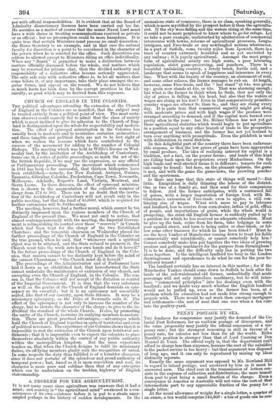A PROBLEM FOR THE AGRICULTURIST.
IT is not many years since agriculture was unaware that it had a mind; and scarcely is "the agricultural mind" awakened to a con- sciousness of its own existence before it is put to a strain unex- ampled perhaps in the history of sudden developments. In the anomalous state of commerce, there is no class, speaking generally, which is more mystified by the prospect before it than the agricultu- rist. If the sky were falling and the waters rising at the same time, it could, not be more perplexed to know where to go for refuge. Let us take a pure example, undisturbed by adulteration of commercial intercourse with towns reforms of agricultural processes, League intrigues, and Free-trade or any newfangled notions whatsoever. In a part of Suffolk, some twenty miles from Ipswich, there is a tract of country extremely beautiful and as yet unvisited by any railway ; it is purely agricultural. Amongst the most proper form of agricultural society are high rents, a poor labouring population, strict game-preserving, and poachers. There is a beautiful undulating country, a lovely brook, fertile soil, and a landscape that seems to speak of happiness and innocence in every line. What with the beauty of the country, an abatement-of rent, and some other solaces, the farmer manages to rub on. At length, however, came Free-trade, and the "last stand" at 64s. was given up : grain now stands at 44s. or 458. That was alarming enough; but what is the farmer to think when he finds, that not only the sky of prices is falling on his head, but also that the waters of wages are rising at his feet ? Even in that comparatively primitive country wages are oftener 9s. than 8s., and they are rising every day. It is quite true that commercial sagacity might get along with moderate prices and with high wages if the produce were arranged according to demand, and if the capital were turned over pretty often in the year : but Mr. Milner Gibson has not yet got those agricultural statistics which would begin to put agriculture in a position equal to any other branch of trade in the prospective arrangement of business, and the farmer has not yet learned to turn over anything with promptitude. Even the pitchfork is used with deliberation in rural districts.
In this delightful part of the country there have been unfavour- able seasons, so that the low prices of grain have been aggravated by small produce. The idea of realizing interest for capital is a tradition, not a fact, on the poorer farms; and lands of this kind are falling back upon the proprietors every Michaelmas. On the high lands and well-stocked farms it is different; tenants for such can easily be found: but here, on the pleasant uplands, the gams is met, and with the game the game-laws, the prowling poacher and the sportsman. Is there any hope that this state of things will mend P—But little. Emigration is daily thinning the labour of the district. One or two of a family go, and then send for their companions to follow. And the farmer anticipates, with a continued fall of prices, with a larger importation of foreign food, with Mr. Gladstone's extension of Free-trade even to apples, a still con- tinuing rise of wages. What with more to pay to labourer and landlord, less to receive from corn-dealer, influx of gold, efflux of people, and importations of grain, while the whole world is prospering, the stout old English farmer is suddenly pulled up to a problem for which he has received no adequate education. Must he give up the task, retire from his farm, take lodgings in some poor squalid street, and turn to being ostler or shoe-black, or fol- low some other business for which he has been fitted ? Must he see the keen Yankee of Manchester coming down to treat his fields commercially and scientifically, or cannot somebody help him ? Cannot somebody make him put together the two ideas of growing produce and getting machinery for the purpose from Birmingham? It is to be done, and the difficulty only lies in putting the two ideas together. Is the intelligent landlord too busy in the London drawingrooms and operahouses to do what he can for the poor be- wildered tenant ?
The landlord certainly has an interest in this matter • for if the Manchester Yankee should come down to Suffolk to look after the lands of the red-waistcoated old farmer, undoubtedly that acute personage will not only introduce machinery, but he will intro- duce "commercial principles" into his dealings even with the landlord; and. we doubt very much whether the English landlord would not be pulled up, even as the farmer has been, at a Problem which his education had not made him strong enough to grapple with. There would be sad work then amongst mortgages andd, settlements—the sort of rout that one sees when a fox runs into the poultry-yard.


























 Previous page
Previous page